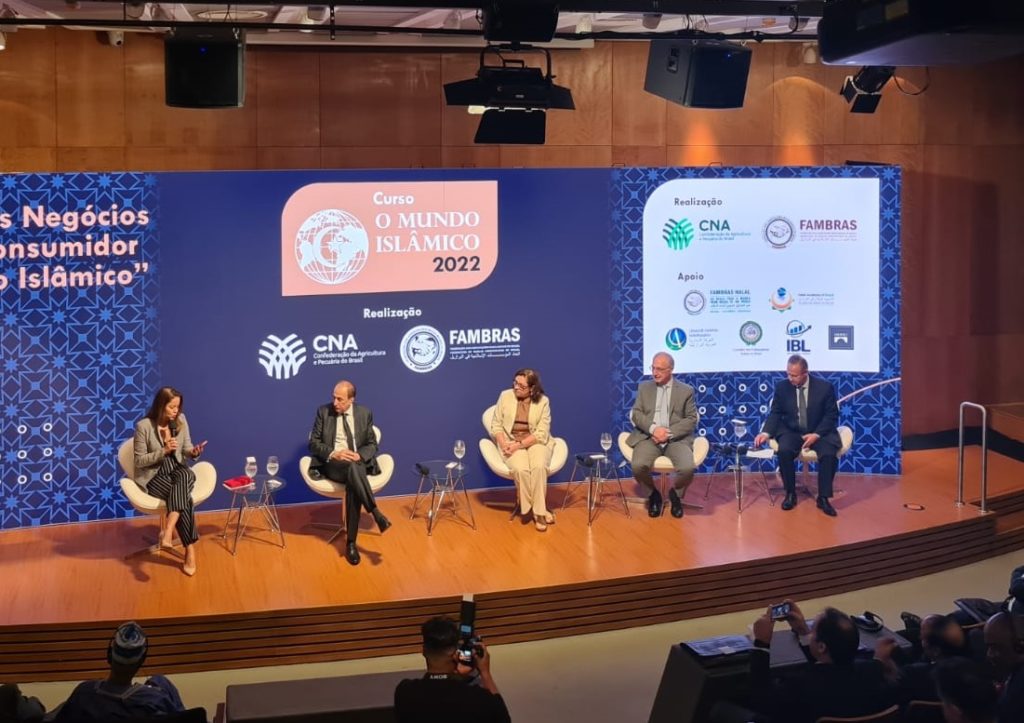São Paulo – The third edition of The Islamic World free course began this Wednesday morning (17) in a hybrid format. Guests attended the first three classes in person in Brasília, and Brazilian businesspeople from different regions of the country and the world watched online. This year’s theme is “Ethics and Business with Consumers in the Islamic World.” The classes inform about opportunities and challenges for Brazilian entrepreneurs in the 57 countries with Islamic majority.
At this first meeting, the subject was “The Muslim population and its particularities,” divided into three classes. The first brought the estimated growth of the Muslim population and the global halal market. The vice president of the Federation of Muslim Associations of Brazil (Fambras), Ali Zoghbi, lectured in the first session. He briefly overviewed Islam and its essential pillars: Respect for differences, freedom of belief, preservation of life, and the halal concept. He also told the story of the Quran, the holy book of Islam.
“Halal means whatever is lawful; its consumption is permitted by God for Muslims according to Sharia, the Islamic law. Halal is the basis of everything lawful in food, social, conduct, justice, clothing, finances, etc. It is a system based on principles and values to benefit humanity,” said Zoghbi.
Zoghbi reported today the world population is eight billion, and 1.9 billion are Muslims (24.5%). By 2060, there will be 9.8 billion people in the world. Of these, 3 billion will be Muslims, or 31.5% of the world’s population, according to estimates, as the Islamic faith population grows faster than others.
The three Muslim-majority countries with the largest population are Indonesia, Pakistan, and Bangladesh. According to Zoghbi, there are still countries like Nigeria and India, where the Muslim population is a minority but still an expressive number. “In India, the Islamic population is 14% of the total, with 204 million adherents. It is the country with the largest Muslim minority in the world. It’s a growing market,” he said. He also mentioned Russia, which has a population of 14 million Muslims, or 10% of the total, and China, now one of the world’s largest halal markets in imports and exports.
The new profile of the Muslim consumer was the topic of the second lecture, given by Alessandra Frisso, managing partner of H2R Pesquisas Avançadas and director of the Arab Brazilian Chamber of Commerce (ABCC). She informed this is a young population, and it is increasingly present in urban centers. About 66% of Muslims worldwide are under 30 and have an income and education. They are increasingly connected, value ethical consumption, buy a lot online, and are fond of global brands aligned with Muslim values. “Muslims are increasingly looking for responsible consumption and convergence between halal and ESG (environmental, social and corporate governance), consuming food, medicines, cosmetics, clothing, and even halal tourism,” she said.
The third session of the day was on the Islamic calendar and its influence on business, conducted by the president of H2R Pesquisas Avançadas and board member of the Guidance and Deliberation Council of the ABCC Rubens Hannun. He spoke about weekends in Muslim-majority countries, which are usually Friday and Saturday, and about dates like Ramadan, the month of fasting, and how that changes consumption and business in this holy month of Islam. “It is important to know and research the country where you are going to do business, to know the days of the weekend and the dates of fasting that year,” he said. According to him, Ramadan is a time of caution for doing business with Muslims. Hannun also reported online consumption times vary during the fasting month when you can only eat and drink after dusk and before dawn.
The opening featured speeches by the president of the Brazilian Confederation of Agriculture and Livestock (CNA), João Martins; the dean of the Council of Ambassadors of Arab Countries to Brazil, and the Palestinian ambassador to Brasília, Ibrahim Alzeben; the president of Fambras, Mohamed Zoghbi; the director of the Department of Energy and Agribusiness of the Brazilian Ministry of Foreign Affairs, Alexandre Ghisleni; and the deputy secretary of Commerce and International Relations of the Brazilian Ministry of Agriculture, Livestock, and Food Supply (MAPA), Fernando Sardenberg. ABCC president Osmar Chohfi participated in the opening event in Brasília.
The course, which had over 1,000 registrations, is promoted by CNA and Fambras, with support from the ABCC, Fambras Halal, Brazil Halal Academy, Council of Arab Ambassadors to Brazil, Brazilian Logistics Institute (IBL), and Brazilian Institute for Development of International Business Relations (IBREI). The following meetings will occur on August 25, and September 1 and 9th, from 9:00 am to 11:15 am BRT.
Translated by Elúsio Brasileiro




